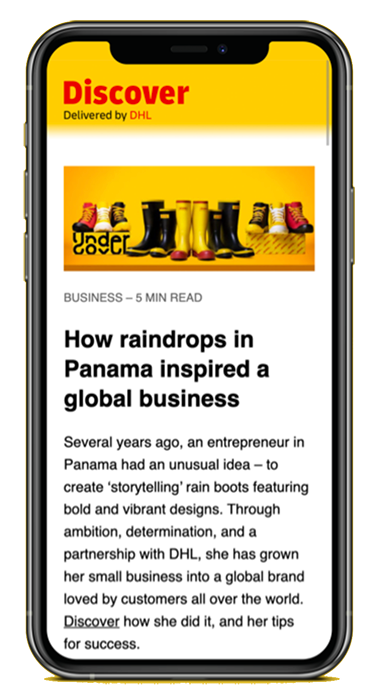Grow your business with the Discover newsletter
Logistics advice & insights straight to your inbox
Subscribe now
Business sustainability is the ability to meet the standards and needs of shareholders and consumers with environmental and social considerations in mind. However, your responsibility towards a greener future is not the only reason to enact sustainable business practices.
About 62% of executives believe a sustainable strategy is necessary to remain competitive today, with another 22% noting its importance in the future. Evidently, as McKinsey & Company has noted before, businesses with higher environmental, social and governance (ESG) ratings outperform the market in medium and long term revenue.
Looking at how environmental and social sustainability is key to business success, it is vital to understand the emerging trends that can change the way you interact with your stakeholders, the public and the environment as a whole.
These top sustainability trends in 2021 and beyond will offer a quick insight.


While population health had been the main focus last year, today, people are prioritising the planet's health over their own, reports Innova's Global Lifestyle and Attitude Survey.
Consumers are actively considering the environmental impact of businesses to facilitate better eco-friendly purchasing decisions. Moreover, they believe in reducing food waste (43%) and eating in moderation (32%) to foster greater environmental sustainability.
While ethical consumerism is not yet a trend in Singapore, over half of the population do advocate for it. Similar sentiments were highlighted in a 2021 poll by the Urban Redevelopment Authority in which Singaporeans found natural spaces, parks, and greenery critical in increasing the nation's citizens' quality of life.
These findings could drive more businesses to put environmental and social sustainability at the core of their operational models.
Within the past decade, the cost of going green has changed tremendously. More environmentally sustainable renewable energy is now cheaper than the cost of new fossil fuels in most places worldwide, making its adoption a favourable trend in 2021 and the years to come.
By increasing our capacity, we can drive down the price of renewable energy. Consequently, a decline in energy prices increases the real incomes of people. In addition to reducing emissions, investments to scale up energy production from renewable sources can also promote economic growth, especially in the world's poorest regions.
To balance out their carbon footprints, businesses can invest in carbon offsetting environmental sustainability projects worldwide, typically in developing countries. With an aim to reduce future emissions, clean energy technologies may be implemented, or carbon credits may be purchased from an emissions trading scheme.
These energy-based projects offer more impactful results than just planting trees and, as a bonus, provide many social and economic benefits. Our GoGreen climate neutral service with DHL Express allows you to offset your greenhouse gas emissions through investing in internationally recognised climate protection projects. Our project in Lesotho, South Africa, is one such initiative.
An investor who practises sustainable investing, also known as socially responsible investing, considers environmental responsibility, social and corporate governance factors before committing money and resources to a company.
Younger impact investors are popular agents of sustainable investing due to the desire to invest in businesses with intrinsic values that promote positive change. These largely revolved around systematic issues, including climate change, social and wealth inequality. In 2020, ESG funds received $51.1 billion investments.
The trend for sustainable investing will carry on beyond 2021. However, in order to attract impact investors, companies may engage in greenwashing activities. Businesses who greenwash falsely claim that the funds will be used to make an environmental or social impact. These entities may be boycotted for falsely presenting an environmentally responsible public image.
On the note of sustainable investments, about $30 trillion of assets invested worldwide depend on ESG information in 2019, 34% more than the figure recorded in 2016. Around 80% of CEOs believe in the importance of demonstrating a commitment to society through sustainability ratings. There are also different approaches to measure ESG ratings. This means companies can easily find a rating that is favourable to their interests, making it possible for them to engage in sustainable investments in line with their values.
The standard on ESG transparency reporting needs to be established to make ESG disclosures more trustworthy to stakeholders. ESG regulations will also continue to increase as ESG popularity grows. As such, companies should consistently publish sustainability reports for investors that outline how sustainable long-term financial returns are generated and environmental risk is mitigated.
Investments aside, such transparency will also aid ethical consumers in their purchase decisions. They will support businesses that focus on environmental and social sustainability, such as introducing zero-waste policies and green energy usage on the last mile.
Noting an increase in cross-border and time-sensitive shipments, alongside growth of e-commerce orders over 40%, our DHL Express team continues to provide for customers without a cost to the environment and our society.
Our decarbonisation plans are an effort in that direction. By 2030, we aim to increase our use of sustainable aviation fuels (SAF) by over 30% and electrify up to 60% of our last mile delivery vehicles. Meanwhile, we are replacing our older Boeing 747-400s with the more efficient and environmentally-friendly Boeing 777 Freighters running 100% on SAF.
Our strong commitment to environmental and social sustainability as a logistics provider allows us to help businesses like yours achieve their green goals. Let us give you a leg-up — get in touch today!